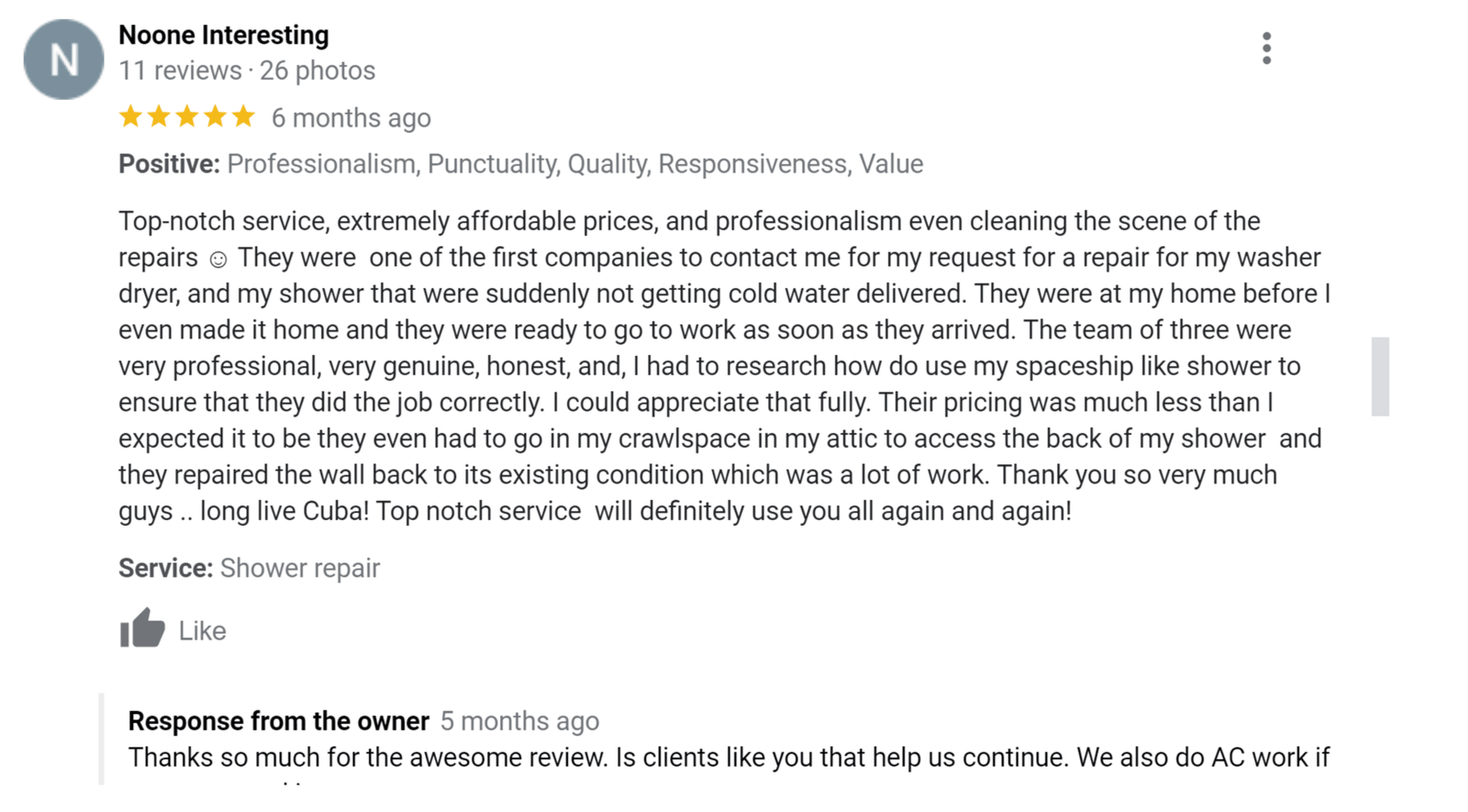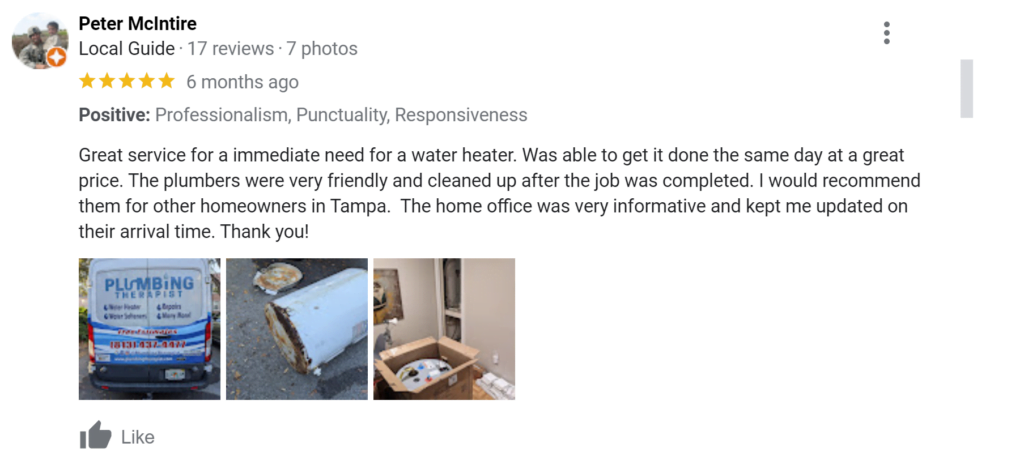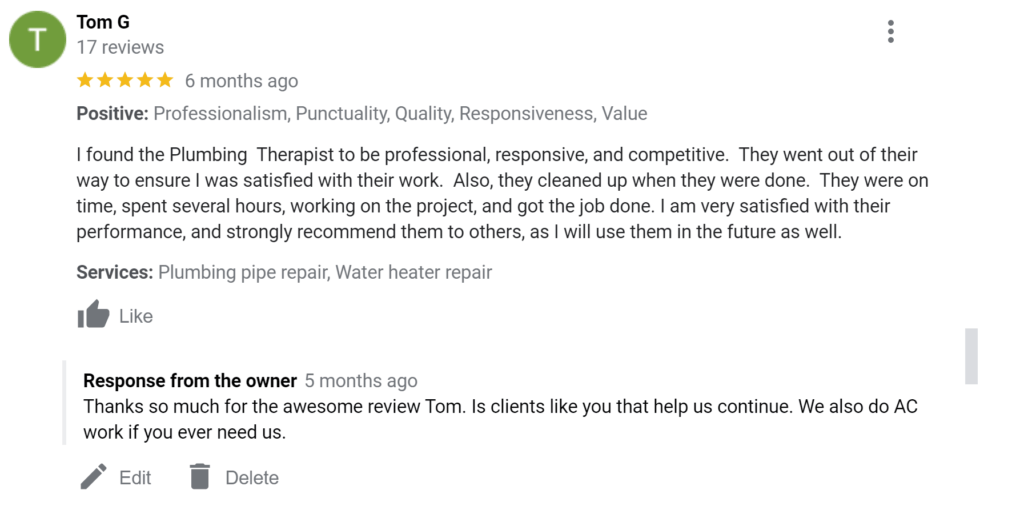Tankless Water Heater Installation
Upgrade your hot water system with tankless water heater installation. Enjoy endless hot water, energy savings, and expert service by Plumbing Therapist in the Tampa Bay area. Say goodbye to cold showers and high energy bills.
Do You Need Our Help ?
Feel free to contact us now
$99 Water Heater Flush + Free Plumbing System Inspection
Tankless Water Heater Installation in Tampa Bay
Experience Comfort with Tankless Water Heater Installation Services in Hillsborough County, Pinellas County, and Pasco County
At Plumbing Therapist, we understand the importance of reliable hot water in your Tampa Bay home. That’s why we offer top-notch tankless water heater installation services. Say goodbye to cold showers and high energy bills with our expert team by your side.
Tankless water heaters are the modern solution to your hot water needs. They provide on-demand hot water, which means no more running out of hot water during long showers or laundry. Plus, they are energy-efficient, reducing your utility bills.
Why Choose Plumbing Therapist for your Tankless Water Heaters Installation:
Choosing Plumbing Therapist for your tankless water heater installation is a smart decision for several compelling reasons:
Expertise and Experience: At Plumbing Therapist, we take pride in our team of certified technicians with extensive experience in tankless water heater installation. You can trust us to handle your installation with precision and professionalism.
Energy Efficiency: We understand the importance of energy-efficient solutions. Our experts will personally guide you to choose the right tankless water heater that not only provides endless hot water but also saves you money on energy bills.
Customized Solutions: We know that every home is unique, and so are its hot water needs. We’ll personally tailor our services to match your specific requirements, ensuring you get the perfect unit for your household.
Safety First: Your safety is our top priority. We personally ensure that we follow all safety codes and regulations during installation to guarantee that your tankless water heater functions safely and reliably.
Transparent Pricing: We offer competitive pricing and provide transparent quotes. You’ll personally know exactly what to expect without hidden costs or surprises.
Reliable Service: At Plumbing Therapist, we’re known for our prompt, reliable, and friendly service. We take personal pride in our commitment to your satisfaction.
Maintenance Plans: We offer maintenance plans to keep your tankless water heater running at its best. Personally, we recommend regular maintenance to ensure optimal performance and extend the lifespan of your unit.
Local Expertise: We’re a local plumbing company serving the Tampa Bay area. We personally understand the unique climate and plumbing needs of the region, making us your trusted local partner.
Customer Satisfaction: Our track record speaks for itself. We have a history of happy customers who have personally benefited from our tankless water heater installation services.
Comprehensive Plumbing Services: Plumbing Therapist offers a wide range of plumbing services, from repairs to maintenance. We’re your one-stop-shop for all your plumbing needs.
Upgrade your hot water system with tankless water heater installation by Plumbing Therapist. Experience the convenience, energy efficiency, and reliability of on-demand hot water. Contact us today for a free consultation and make cold showers a thing of the past.

Why partner with Plumbing Therapist?
Quality, Affordability, and Expertise.

No Hidden or Unexpected Charges

Free Estimates & Online Booking Available

Professionally Trained Technicians

Honesty is Guaranteed

Quick Communication & Service Within 24 Hours

400+ 5 Star Reviews

Why do you need to install a Tankless Water Heater?
Installing a tankless water heater offers a range of benefits that make it a popular choice among homeowners:
Endless Hot Water: Tankless water heaters provide hot water on demand. You’ll never run out of hot water during showers, baths, or while doing laundry or dishes.
Energy Efficiency: Tankless units are highly energy-efficient. They only heat water when you need it, reducing standby energy losses and potentially lowering your energy bills.
Space-Saving Design: Tankless water heaters are compact and wall-mounted, freeing up valuable space in your home compared to traditional tank-style heaters.
Longer Lifespan: Tankless heaters typically have a longer lifespan than traditional tanks. With proper maintenance, they can last up to 20 years or more.
Reduced Maintenance: Tankless units require less maintenance since they lack a tank that can accumulate sediment and rust. This can save you time and money over the long term.
Improved Water Quality: Because there’s no tank to rust or accumulate debris, tankless water heaters often provide cleaner, fresher hot water.
Reduced Risk of Leaks: Tankless heaters eliminate the risk of tank leaks and water damage, a common issue with traditional water heaters.
Environmental Benefits: Tankless water heaters are more eco-friendly due to their energy efficiency. They reduce your carbon footprint by consuming less energy.
Precise Temperature Control: You can adjust the temperature of hot water precisely with tankless units, ensuring it’s just right for your needs.
Resale Value: Tankless water heaters can increase the resale value of your home, as they are considered a desirable feature by potential buyers.
Government Incentives: In some areas, you may be eligible for government incentives or rebates for installing energy-efficient tankless water heaters, further reducing your costs.
Reduced Risk of Legionella: Tankless water heaters reduce the risk of Legionella bacteria growth, which can be a concern in stagnant water within traditional tanks.
Tankless water heaters offer convenience, energy savings, and longevity, making them an attractive option for homeowners looking to upgrade their hot water systems.
If you would like more information, feel free to give them a call at (813)-437-4477 or you can book online and get their latest discount!
Customer Testimonials: Real Experiences with Plumbing Therapist
We proudly share the experiences and stories of our valued clients. Their feedback provides a glimpse into the quality of service and commitment to excellence we uphold at Plumbing Therapist. You'll read firsthand how our plumbing solutions have improved comfort and efficiency in homes across Tampa Bay. These testimonials illustrate our dedication to customer satisfaction and the difference our expert services can make.




Your questions answered
Common Tankless Water Heater Installation Questions:
How does a tankless water heater work?
A tankless water heater, also known as an on-demand or instantaneous water heater, operates differently from traditional tank-style water heaters. Here’s how it works:
Cold Water Inlet: When you turn on a hot water tap or appliance, cold water from your plumbing enters the tankless water heater.
Flow Sensor: Inside the tankless unit, a flow sensor detects the water flow and signals the heating elements or burner to activate.
Heating Process: The heating elements, powered by electricity or a gas burner (natural gas or propane), rapidly heat the water as it passes through a heat exchanger.
Hot Water Output: The hot water is then delivered directly to your faucet or appliance in real-time. It’s instantly available at the desired temperature without the need for a storage tank.
Temperature Control: Most tankless water heaters have built-in temperature controls that allow you to set the desired hot water temperature. This ensures you get hot water at the temperature you want.
Continuous Supply: Tankless water heaters provide a continuous supply of hot water as long as there is a demand for it. Unlike tank-style heaters, there is no risk of running out of hot water.
Shutdown: When you turn off the hot water tap or appliance, the tankless water heater stops heating water, conserving energy.
Key Advantages:
- Energy Efficiency: Tankless water heaters only heat water when needed, reducing energy consumption and lowering utility bills.
- Space-Saving: They are compact and wall-mounted, saving space compared to bulky tank-style heaters.
- Longer Lifespan: Tankless units typically last longer than traditional tanks.
- Endless Hot Water: There’s no need to wait for a tank to refill, ensuring a constant supply of hot water.
Keep in mind that the capacity of a tankless water heater depends on its size and the temperature rise it can achieve. It’s essential to choose the right-sized unit for your home’s hot water needs to ensure optimal performance.
What size tankless water heater do I need for my home?
Determining the right size tankless water heater for your home is essential to ensure it meets your hot water needs efficiently. Here’s a general guideline to help you calculate the size you need:
Determine Your Peak Hot Water Demand: Start by identifying the maximum number of hot water fixtures or appliances that may be in use simultaneously in your home. These may include showers, faucets, washing machines, dishwashers, etc.
Determine the Flow Rate (GPM): Each fixture or appliance has a flow rate, measured in gallons per minute (GPM). You can usually find this information in the product’s specifications or by using a flow meter.
Calculate Total GPM: Add up the GPM for all the fixtures and appliances that might run at the same time during peak demand. This will give you the total GPM required.
Temperature Rise: Determine the temperature rise required. This is the difference between the incoming groundwater temperature and the desired hot water temperature. For example, if your groundwater is at 50°F, and you want hot water at 120°F, the temperature rise is 70°F.
Consult a Sizing Chart or Calculator: Most manufacturers provide sizing charts or online calculators that can help you determine the appropriate tankless water heater size based on your total GPM and temperature rise.
Consider Your Fuel Type: Gas-powered tankless water heaters typically have a higher flow rate than electric units, so if you have a high hot water demand, a gas unit may be more suitable.
Factor in Usage Patterns: Consider your family’s hot water usage patterns. Do you have teenagers who take long showers, or do you frequently use multiple hot water appliances at the same time? This information can help you choose a unit that can handle your specific needs.
Consult a Professional: For a precise sizing recommendation, it’s advisable to consult a professional plumber or a tankless water heater specialist. They can assess your home’s hot water demands and recommend the right-sized unit.
Remember that choosing the right size is crucial for optimal performance and energy efficiency. An undersized unit may not provide enough hot water, while an oversized unit could lead to unnecessary energy consumption. Taking the time to calculate your hot water needs accurately will help you make an informed decision when selecting a tankless water heater for your home.
Is a tankless water heater more energy-efficient than a traditional tank heater?
Yes, tankless water heaters are generally more energy-efficient than traditional tank-style water heaters. Here’s why:
No Standby Heat Loss: Tankless Water Heaters: Unlike traditional tank heaters that constantly heat and store a large volume of water, tankless water heaters only heat water as it’s needed. This means there’s no standby heat loss, where energy is wasted keeping a tank of water hot 24/7.
On-Demand Heating: Tankless units heat water on-demand. When you turn on a hot water tap, the heating elements or burner activate, rapidly heating the water as it flows through the unit. This process is efficient and ensures you get hot water immediately.
Energy Savings: Because tankless heaters are not continuously cycling on and off to maintain water temperature, they can result in significant energy savings, especially in homes with low to moderate hot water usage.
Longer Lifespan: Tankless water heaters often have a longer lifespan than tank-style heaters. This means you’ll replace them less frequently, reducing the overall environmental impact.
Compact Size: Tankless units are compact and wall-mounted, freeing up space in your home and reducing heat loss through the walls of a tank.
Precise Temperature Control: Tankless water heaters allow you to set the desired hot water temperature precisely. This helps prevent overheating and reduces the need for mixing cold water, which can further save energy.
However, it’s important to note that the energy savings with tankless water heaters can vary depending on factors like your hot water usage patterns, the efficiency of the unit, and your local energy costs. While tankless units are more energy-efficient, they may have a higher upfront cost than traditional tank-style heaters.
To determine whether a tankless water heater is a cost-effective and energy-efficient choice for your home, consider factors like your hot water demands, budget, and the availability of fuel sources (electricity, natural gas, propane). Consulting with a plumbing professional can also help you make an informed decision based on your specific circumstances.
Are there any safety concerns with tankless water heater installation?
Tankless water heater installations are generally safe when done correctly by a qualified professional. However, like any home appliance, there are some safety considerations to keep in mind:
Gas Leak Risk (Gas-Powered Units): If you have a gas-powered tankless water heater, there’s a potential for gas leaks if the unit is not installed or maintained properly. To mitigate this risk:
- Ensure the unit is installed by a licensed professional who follows local building codes.
- Schedule regular maintenance checks to inspect for gas leaks and ensure the gas line is secure.
Carbon Monoxide (CO) Emissions (Gas-Powered Units): Gas tankless water heaters produce combustion byproducts, including carbon monoxide. To minimize the risk of CO exposure:
- Install a CO detector near the unit and in sleeping areas.
- Schedule annual inspections to ensure proper venting and combustion.
Hot Water Burns: Tankless water heaters can deliver very hot water, which may pose a scalding hazard, especially for households with children or elderly residents. To prevent burns:
- Install anti-scald devices on faucets and showers.
- Set the water heater to a safe and comfortable temperature.
Electrical Safety (Electric Units): Electric tankless water heaters require a dedicated electrical circuit. Ensure that:
- The unit is connected to the correct voltage and amperage.
- Wiring is done by a qualified electrician to prevent electrical hazards.
Water Pressure and Temperature Fluctuations: In some cases, tankless units may experience fluctuations in water pressure or temperature if they are not properly sized for the home’s needs. To address this:
- Ensure the unit is correctly sized to meet your peak hot water demand.
- Consider installing pressure regulators and expansion tanks if needed.
Ventilation (Gas-Powered Units): Proper ventilation is crucial to remove combustion gases safely. Ensure that:
- Ventilation is installed according to manufacturer and local code specifications.
- Regularly inspect and clean vents to prevent blockages.
Installation by Professionals: The safest approach is to have your tankless water heater installed by a licensed and experienced plumber or HVAC technician. They will ensure that the unit is installed correctly, minimizing safety risks.
Regular Maintenance: Schedule routine maintenance and inspections to identify and address any potential safety issues promptly.
By following safety guidelines, having your tankless water heater installed and maintained by professionals, and being vigilant about safety precautions, you can enjoy the benefits of hot water without significant safety concerns.
What is the expected water flow rate and temperature rise for a tankless water heater?
The expected water flow rate and temperature rise for a tankless water heater can vary based on several factors, including the unit’s size, fuel type (electric or gas), and the incoming groundwater temperature. Here are some general guidelines:
Flow Rate (GPM – Gallons Per Minute): Tankless water heaters are rated based on their maximum flow rate, which is the amount of hot water they can deliver per minute. Common flow rates for residential tankless water heaters range from 2 to 8 GPM or more.
Temperature Rise: Temperature rise refers to the increase in water temperature that a tankless water heater can achieve as it heats the cold groundwater. The greater the temperature rise, the more the unit can heat the water.
Incoming Groundwater Temperature: The temperature of the groundwater entering your home varies depending on your location and the season. For example, in colder climates, groundwater may be much colder in winter than in summer.
To determine the expected water flow rate and temperature rise for a specific tankless water heater in your home, you’ll need to consider your local groundwater temperature and your hot water needs. Here’s a basic calculation to estimate the temperature rise needed:
Temperature Rise = Desired Hot Water Temperature – Incoming Groundwater Temperature
For example, if your desired hot water temperature is 120°F, and your incoming groundwater temperature is 50°F, then you would need a tankless water heater with a temperature rise of 70°F to achieve your desired hot water temperature.
Keep in mind that larger tankless units can typically provide a higher flow rate and achieve a greater temperature rise. It’s essential to choose a unit that can meet your peak hot water demand, which is determined by the number of hot water fixtures and appliances in use simultaneously in your home.
Consulting the manufacturer’s specifications and guidelines for a specific tankless water heater model is also crucial when determining its flow rate and temperature rise capabilities. Additionally, professional plumbers or HVAC technicians can help you select the right-sized unit based on your specific needs and location.

